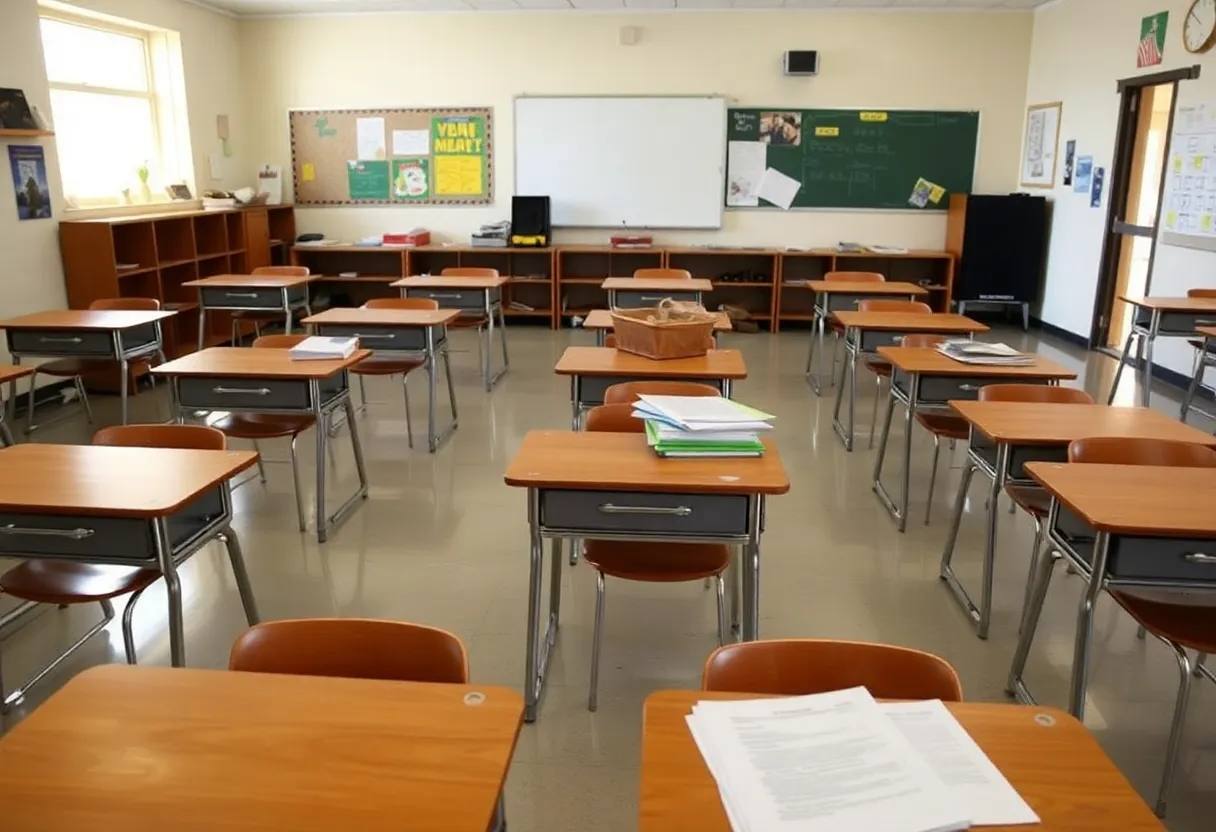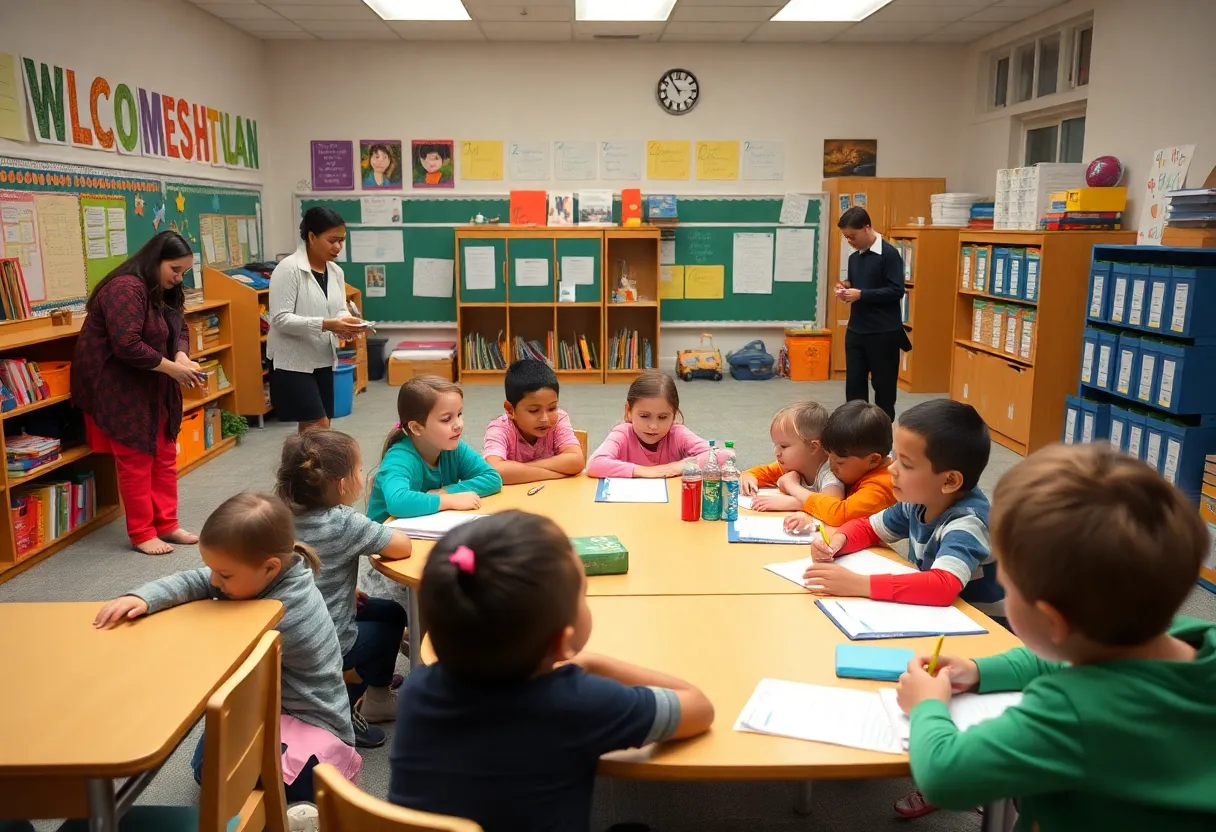News Summary
Arizona’s public education system is in crisis, facing multiple school closures due to severe funding shortages and declining student enrollment. Last year, 20 schools closed, with even more districts considering similar actions. Factors contributing to this situation include insufficient state funding and the impact of a voucher program that diverts funds from public schools. The community is responding with campaigns to prevent closures, highlighting the urgent need for sustainable solutions to maintain access to education for families reliant on local schools.
Arizona Schools Face Increasing Threat of Closures Due to Funding Issues and Enrollment Declines
Arizona is experiencing an unprecedented crisis in its public education system, with multiple school closures looming across various districts due to funding shortages and declining student enrollment. The situation is causing widespread uncertainty for families who rely on local neighborhood schools for their children’s education.
Recent and Planned School Closures
Last school year, 20 schools across the state were forced to close, marking a significant reduction in available public education facilities. This year, even more districts are considering closures, with some planning to shut multiple schools entirely. The Kyrene School District, located in Tempe, is contemplating closing up to one-third of its schools, citing severe financial constraints. Similarly, the Amphi School District in Tucson is considering shutting down five of its twelve elementary schools.
Contributing Factors to School Closures
The primary reasons behind these closures are a combination of decreasing student enrollments and insufficient state funding. The Kyrene School District, built to serve approximately 20,000 students, currently enrolls about 12,000 students, reflecting a substantial drop in attendance. Falling birth rates and rising housing costs in the area are cited as significant factors contributing to fewer children in schools.
Another key issue impacting district finances is the state’s voucher program, which diverts funds away from public schools. Kyrene schools report that they face budget cuts between $7 million and $12 million annually, with vouchers costing the district around $12.1 million per year. The Amphi district in Tucson loses approximately $13.7 million annually to vouchers, with a notable portion of voucher students never having attended public schools before switching to private options.
Similarly, the Roosevelt School District has closed five schools to save about $8 million per year, which is offset by an $8 million annual loss to voucher programs. The Paradise Valley Unified School District has also shut down three schools as part of efforts to mitigate its annual $30 million loss caused by vouchers.
Impact and Criticism of the Voucher Program
The voucher system in Arizona was implemented without adequate planning or oversight, leading to concerns about its financial sustainability. It is criticized for draining resources from public education and benefiting wealthier families who can afford private schooling. Currently, over 90,000 students participate in the ESA voucher program, which has expanded access primarily for higher-income families. There have been reports of fraud and abuse linked to the system, raising questions about the proper use of taxpayer dollars.
Community Response and Future Plans
The Kyrene School District board has indicated they may revise their initial school closure proposals based on community feedback. Decisions on closures are now expected to be postponed until December to allow local input. Community meetings are scheduled throughout October and November to give parents and residents opportunities to voice their concerns.
Parents and local residents are actively campaigning to prevent closures, creating petitions and online platforms to raise awareness and advocate for more equitable solutions. The ongoing decline in student numbers and financial challenges continue to place pressure on districts to find sustainable ways to maintain access to public education amid shrinking resources.
As Arizona districts seek to navigate these financial hardships, the future of many schools remains uncertain, highlighting the broader implications of funding policies and demographic shifts on public education across the state.
Deeper Dive: News & Info About This Topic
HERE Resources
Navajo Nation Advocates for Educational Support
Kyrene School District Updates Closure Plans
Kyrene School District Faces Community Opposition Over School Closures
Chamlian Armenian School Reacts to Blue Ribbon Program Cancellation
Kyrene School District Weighs School Closures Amid Budget Struggles
Highland High School Football Season Stalled Over Safety Issues
Wilmington High Schools Shine in 2025 Rankings
Kyrene School District Plans to Close Nine Schools
Student Fatally Injured in Stabbing Incident at Maryvale High School
Kyrene de la Sierra Elementary School Extension of Closure
Additional Resources
- AZFamily: Kyrene School Closure Plans Revised
- Washington Post: Arizona Public School Closures and Voucher Program
- AZ Free News: New Dashboard Tracks School Closures
- Google Search: Arizona School Closures
- ABC15: Kyrene Families Plan Peaceful Protest
- Wikipedia: Education in Arizona
Author: STAFF HERE WASHINGTON DC
The WASHINGTON DC STAFF WRITER represents the experienced team at HEREWashingtonDC.com, your go-to source for actionable local news and information in Washington, DC, and beyond. Specializing in "news you can use," we cover essential topics like product reviews for personal and business needs, local business directories, politics, real estate trends, neighborhood insights, and regional news affecting the area—with deep expertise drawn from years of dedicated reporting and strong community input, including local press releases and business updates. We deliver top reporting on high-value events such as the National Cherry Blossom Festival, Kennedy Center Honors, and the Washington Auto Show. Our coverage extends to key organizations like the Greater Washington Board of Trade and Destination DC, plus leading businesses in government contracting and technology that power the local economy such as Lockheed Martin and Amazon. As part of the broader HERE network, we provide comprehensive, credible insights into the dynamic landscape of the Washington metropolitan area.




